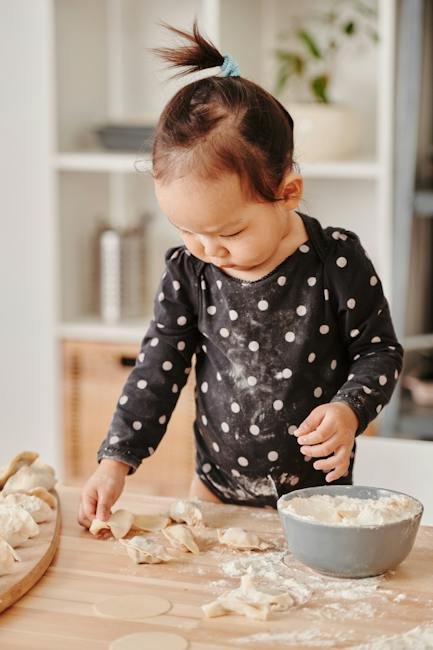Making homemade baby formula is a form of nurturing that goes beyond measuring ingredients and mixing them together—it’s a labor of love, carefully crafted to provide your little bundle of joy with the best nutrition possible. As a parent, you strive to ensure every aspect of your baby’s well-being, and understanding what goes into their tiny bodies is paramount. In this step-by-step guide, we will take you on a journey into the world of homemade baby formula, unveiling the secrets of creating a nourishing elixir from scratch. So roll up your sleeves, gather the essential ingredients, and let’s embark on a heartfelt culinary adventure that will give your little one a tender start in life.
Table of Contents
- Choosing the Right Ingredients for Homemade Baby Formula
- Understanding the Nutritional Needs of Your Baby
- Step-by-Step Instructions for Making Homemade Baby Formula
- Important Safety Precautions when Making Homemade Baby Formula
- Customizing and Adapting the Recipe for Your Baby’s Needs
- Q&A
- To Conclude

Choosing the Right Ingredients for Homemade Baby Formula
Key Considerations for Choosing the Right Ingredients
When it comes to preparing homemade baby formula, selecting the right ingredients is crucial for your baby’s health and nutrition. Here are a few factors to keep in mind when deciding what goes into your little one’s formula:
1. Nutritional Value: Opt for ingredients that provide essential nutrients and support your baby’s growth and development. Consider incorporating ingredients like organic whole milk or plant-based alternatives, such as almond or soy milk, to ensure a good source of protein, healthy fats, and vitamins.
2. Allergies and Intolerances: Take into account any known allergies or intolerances your baby may have, such as lactose intolerance or gluten sensitivity. In such cases, you can explore suitable substitutes like lactose-free milk or gluten-free grains to prevent any adverse reactions.
3. Quality and Safety: Prioritize the quality and safety of the ingredients you choose. Look for organic options that are free from additives, preservatives, and harmful chemicals. Additionally, consider using filtered or boiled water to ensure a clean and germ-free base for your homemade formula.
4. Professional Advice: It is always advisable to consult with a pediatrician or a healthcare professional before preparing homemade baby formula. They can provide valuable guidance and help tailor the recipe according to your baby’s specific needs and dietary requirements.
Remember, your baby’s well-being should be the paramount consideration when it comes to selecting ingredients for homemade formula. Careful research, consultation, and attention to detail will help provide a nurturing and wholesome alternative for your little one’s nutritional needs.

Understanding the Nutritional Needs of Your Baby
The Importance of
When it comes to providing the best care for your little one, understanding their nutritional needs is crucial. A well-balanced diet not only supports their growth and development but also lays the foundation for a lifetime of good health. It is essential to keep in mind that every baby is unique and may have different dietary requirements. But fret not! Below are some key points to help you navigate the world of your baby’s nutrition:
- Breast milk or formula: In the early days, babies rely solely on breast milk or formula for their nutritional needs. Breast milk, in particular, provides a multitude of benefits, including essential nutrients, antibodies, and bonding time with the mother. If breastfeeding is not an option, discuss with your pediatrician the best formula choice for your little one.
- Introduction to solid foods: Around six months of age, your baby will gradually transition to solid foods. Start with single-ingredient purees, such as mashed bananas or sweet potatoes, and gradually introduce a variety of fruits, vegetables, and grains. Remember to give them enough time to explore different flavors and textures.
- Nutrient-dense foods: As your baby grows, make sure to incorporate a wide array of nutrient-dense foods in their diet. These can include lean proteins, such as chicken or fish, whole grains, fruits, and vegetables. These foods provide essential vitamins, minerals, and healthy fats that support their overall development.
Remember, each milestone in your baby’s nutrition journey is unique and exciting. Consulting with a pediatrician or a certified nutritionist can provide personalized guidance to meet your baby’s specific needs. By understanding and ensuring adequate nutrition, you can lay the groundwork for a healthy future for your precious little one.

Step-by-Step Instructions for Making Homemade Baby Formula
Creating homemade baby formula is a wonderful way to ensure that your little one is receiving the best nutrition possible. Although it may seem like a daunting task, with the right ingredients and step-by-step instructions, you can easily prepare a healthy and nutritious formula right in the comfort of your own kitchen.
Ingredients:
- 2 cups of organic whole milk
- 1 cup of filtered water
- 1 tablespoon of organic lactose
- 1 teaspoon of organic vegetable oil
- 1 teaspoon of organic coconut oil
- 1/4 teaspoon of organic liquid probiotic
- A pinch of organic turmeric (optional)
Instructions:
- Begin by sterilizing all utensils, bottles, and equipment that will come into contact with the formula.
- In a clean saucepan, mix the organic whole milk and filtered water. Heat the mixture over low heat until it reaches a temperature of 160°F (70°C). This step is important to kill any potential harmful bacteria in the milk.
- Once heated, remove the saucepan from the heat and allow the mixture to cool to room temperature.
- In a separate container, dissolve the organic lactose in a little warm water. Stir until fully dissolved.
- Add the dissolved lactose, organic vegetable oil, organic coconut oil, organic liquid probiotic, and pinch of organic turmeric (if desired) to the cooled milk mixture.
- Using a blender or handheld mixer, blend the ingredients until well combined and smooth.
- Pour the homemade formula into sterilized bottles and store in the refrigerator until ready to use. Remember to discard any unused formula after 48 hours.
- Before feeding your baby, warm a bottle of the homemade formula by placing it in a bowl of warm water. Test the temperature on the inside of your wrist to ensure it is lukewarm before feeding.
With these simple step-by-step instructions, you can create a homemade baby formula that provides all the necessary nutrients for your little one’s growth and development. Always consult with your pediatrician before making any changes to your baby’s diet and be sure to monitor their reaction to the formula closely. Enjoy the satisfaction of knowing you can nourish your baby with your own lovingly made formula.

Important Safety Precautions when Making Homemade Baby Formula
Ensuring the safety of your baby is of utmost importance when considering homemade baby formula. Here are some essential safety precautions to follow:
- 1. Use sterilized equipment: Always sterilize all bottles, utensils, and any other equipment used for preparing and storing the formula. This helps eliminate potential harmful bacteria and ensures a hygienic environment for your baby.
- 2. Choose quality ingredients: Opt for high-quality, organic ingredients to minimize the risk of contaminants. Ensure that the dairy products, such as milk and yogurt, are fresh and within their expiration dates.
- 3. Maintain proper hygiene: Wash your hands thoroughly with soap and water before handling any ingredients or equipment. Additionally, sanitize the countertops and any surfaces used during the formula preparation process.
- 4. Accurate measurements: When measuring ingredients, use proper measuring tools such as a calibrated scale or measuring cups. Following the recipe accurately helps maintain the nutritional balance required for your baby’s delicate system.
- 5. Prepare in small batches: To minimize the risk of contamination and ensuring freshness, prepare the formula in small quantities. This reduces the chances of leftover formula sitting out for too long, which can become a breeding ground for bacteria.
- 6. Storage and labeling: Properly store the homemade formula in sterilized, airtight containers in the refrigerator. Clearly label each container with the preparation date to ensure proper rotation and prevent using expired batches.
- 7. Regularly monitor and discard: Inspect the formula closely before feeding your baby. If you notice any discoloration, foul odor, or abnormal consistency, discard it immediately. Safety should always be prioritized.
By adhering to these important safety precautions, you can provide your little one with a nourishing and safe alternative to commercial baby formula. Remember, consulting your pediatrician before making any changes to your baby’s diet is crucial to ensure their nutritional needs are met.
Customizing and Adapting the Recipe for Your Baby’s Needs
When it comes to feeding your baby, every little one is unique. That’s why it’s essential to customize and adapt recipes according to their specific needs. Here are some tips to help you navigate the world of baby food customization:
1. Know Your Baby’s Preferences and Allergies
Observe your baby’s reactions to different foods and take note of any allergies or sensitivities. This will help you avoid ingredients that may cause discomfort or adverse reactions. Remember, always consult with a pediatrician if you suspect any allergies or need guidance on specific ingredients.
2. Gradual Introductions
Introducing new flavors and textures to your little one’s diet is a wonderful experience. However, it’s important to introduce new foods gradually. Start with simple purees and slowly incorporate more complex flavors and textures as your baby grows. This approach allows your baby to adapt to new tastes and prevents overwhelming their developing palate.
3. Spice it Up!
Contrary to popular belief, bland doesn’t necessarily mean better when it comes to baby food. As your baby reaches the appropriate age, you can start adding spices and herbs to their meals. This not only enhances the taste but also exposes them to a variety of flavors. Just be cautious and introduce one spice or herb at a time in small quantities to assess your baby’s reaction.
4. The Power of Homemade
Consider making your baby’s food at home. By doing so, you have full control over the ingredients, allowing you to customize meals according to their nutritional needs. Homemade baby food also helps in avoiding added sugars, preservatives, and artificial flavors. Plus, it can be a rewarding experience for you as a parent, knowing exactly what your little one is consuming.
Q&A
Q: Is it safe to make homemade baby formula?
A: Making homemade baby formula can be risky, as it poses a higher risk of contamination and may lack essential nutrients found in commercially available products. Consulting a pediatrician is strongly advised before considering this option.
Q: What are the reasons why someone might consider making homemade baby formula?
A: Some parents may choose to make homemade baby formula due to specific dietary restrictions or allergies, as well as a desire for greater control over the ingredients used. However, it is crucial to ensure that all necessary nutrients are met.
Q: What ingredients are commonly used in homemade baby formula?
A: Common ingredients include whole milk or milk alternatives, such as almond or coconut milk, as well as various supplements like probiotics and DHA supplements designed for infants.
Q: How can I make sure the homemade formula is safe and nutritious?
A: If you decide to make homemade baby formula, it is essential to follow a trusted recipe designed by a healthcare professional, ensuring it contains all necessary nutrients and meets the baby’s specific dietary needs.
Q: Can I use regular cow’s milk for homemade baby formula?
A: It is generally recommended to avoid using regular cow’s milk as the primary ingredient for homemade baby formula, as it lacks certain nutrients necessary for an infant’s development. Consult with a pediatrician for suitable alternatives.
Q: How long can homemade baby formula be stored?
A: It is recommended to make only enough homemade baby formula that can be consumed within 24 hours. Proper storage and refrigeration are crucial to prevent bacterial growth and maintain freshness.
Q: What are the potential risks associated with homemade baby formula?
A: Homemade baby formula may pose risks such as contamination, insufficient nutrients, or imbalance in specific vitamins and minerals crucial for the baby’s growth. Consulting with a healthcare professional is vital to minimize these risks.
Q: Can I adjust the recipe for homemade baby formula as my baby grows?
A: As infants’ nutritional needs change over time, it’s crucial to consult with a pediatrician to adjust the recipe of homemade baby formula accordingly. They will guide you on what modifications, if any, are necessary for your baby’s stage of development.
Q: Are there any alternatives to homemade baby formula?
A: If making homemade baby formula is not a suitable option for you, there are various commercially available alternatives that meet infants’ nutritional needs. These include ready-to-feed formulas, powdered formulas, or specialized formulas for specific dietary requirements. Consult a pediatrician to determine the best option for your baby.
Q: Is it safe to give homemade baby formula to a premature baby?
A: Homemade baby formula is not recommended for premature babies or infants with specific health conditions, as they require specific nutrients and careful monitoring. Always consult a neonatologist or pediatrician for specialized guidance.
To Conclude
As we reach the end of this journey into the world of homemade baby formula, it is important to reflect on the invaluable knowledge we have gained. By learning how to prepare nutritious, safe, and homemade baby formula, you have taken a significant step towards ensuring your little one’s well-being. Remember, whether it’s due to personal preference, dietary requirements, or simply a desire to provide the best for your baby, you now possess the means to create a nourishing blend from the comfort of your own kitchen.
Making homemade baby formula may seem like a daunting task at first, but as you follow each step with care and precision, you will become more confident and adept. As always, pay attention to sourcing the highest-quality ingredients and follow the recommended guidelines from pediatricians and nutrition experts.
This guide has equipped you with the knowledge necessary to embark on this unique endeavor, but remember to consult with your healthcare provider before making any significant changes to your baby’s diet.
As you prepare this nourishing elixir of love for your baby, keep in mind that the true recipe for a healthy upbringing goes beyond mere nutrition. Cherish the moments of closeness, embrace the giggles, and revel in the simple joy of providing for your little one’s needs.
As your baby grows, so too will your confidence in your ability to provide the best for them. With each step, you have nurtured their development, strengthened your bond, and embarked on a journey of parenthood filled with love, dedication, and a touch of creativity.
So, embrace the art of making homemade baby formula as you continue to explore the wonderful world of parenthood. May your kitchen be filled with the sweet aroma of lovingly crafted nutrition, and may your baby thrive, nourished by the labor of your parental devotion.
As an affiliate, my content may feature links to products I personally use and recommend. By taking action, like subscribing or making a purchase, you’ll be supporting my work and fueling my taco cravings at the same time. Win-win, right?
Want to read more? Check out our Affiliate Disclosure page.